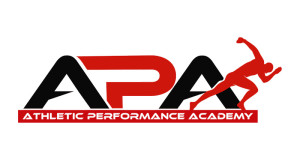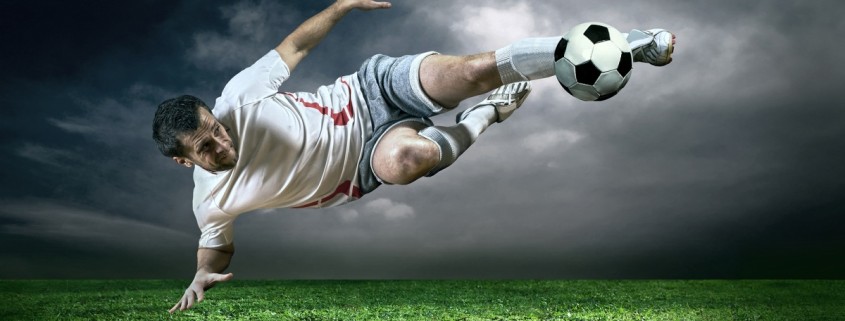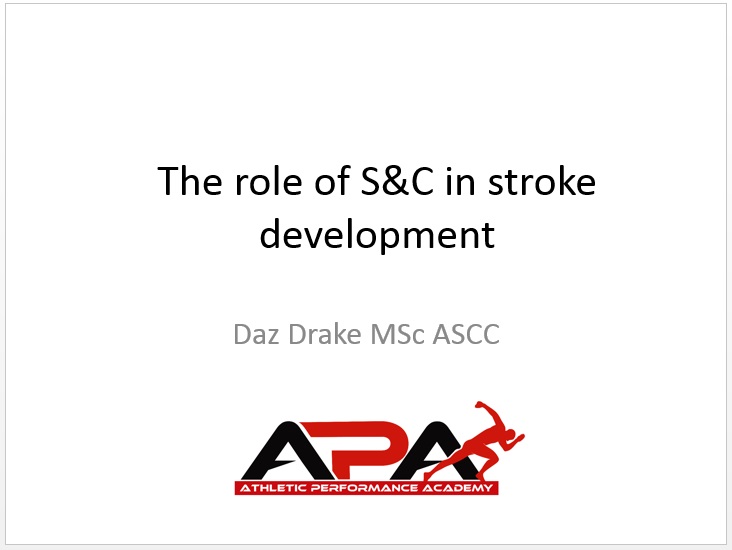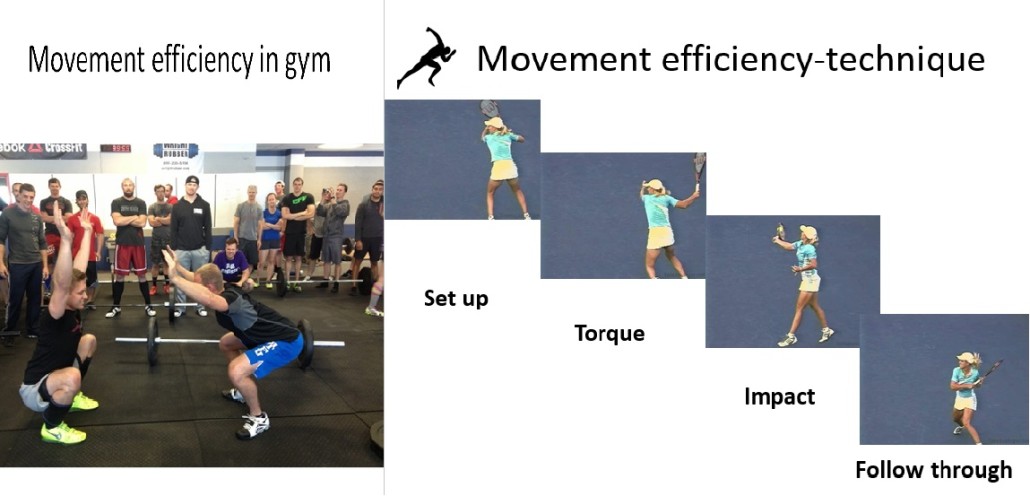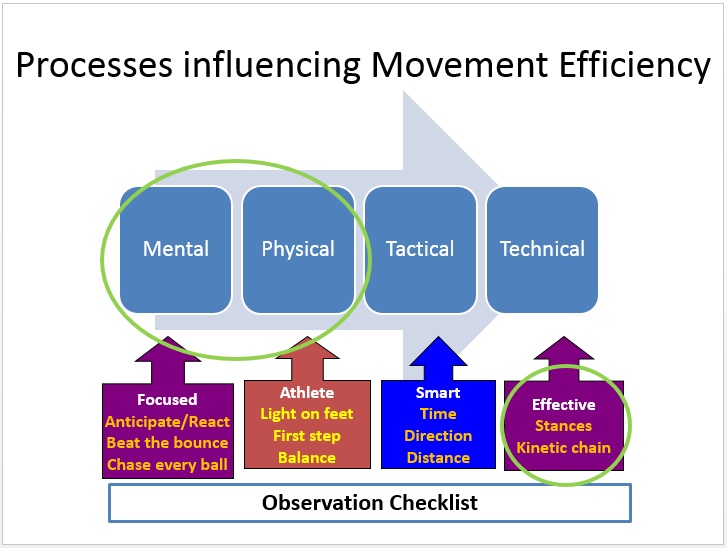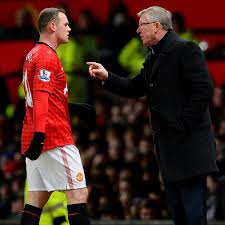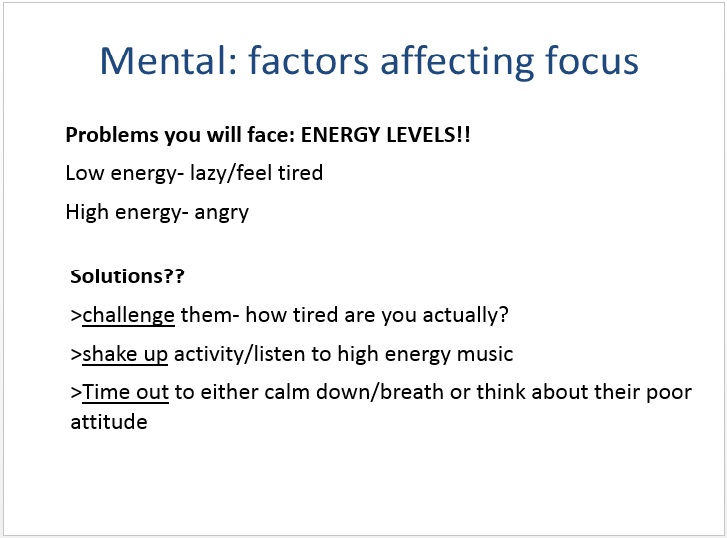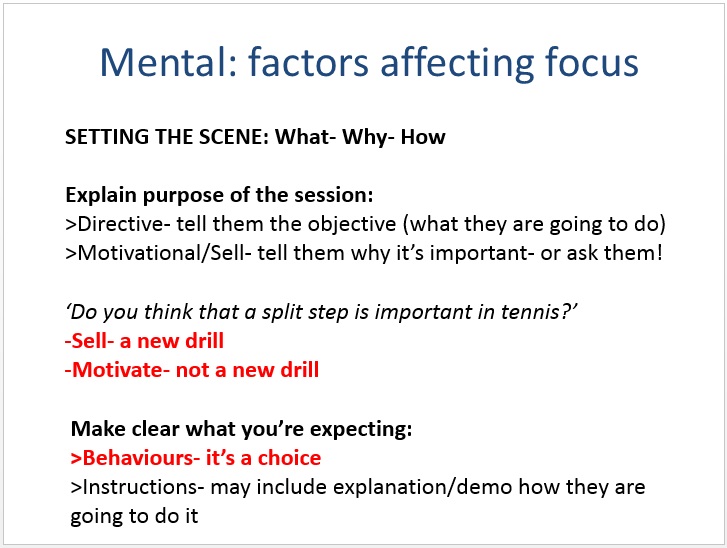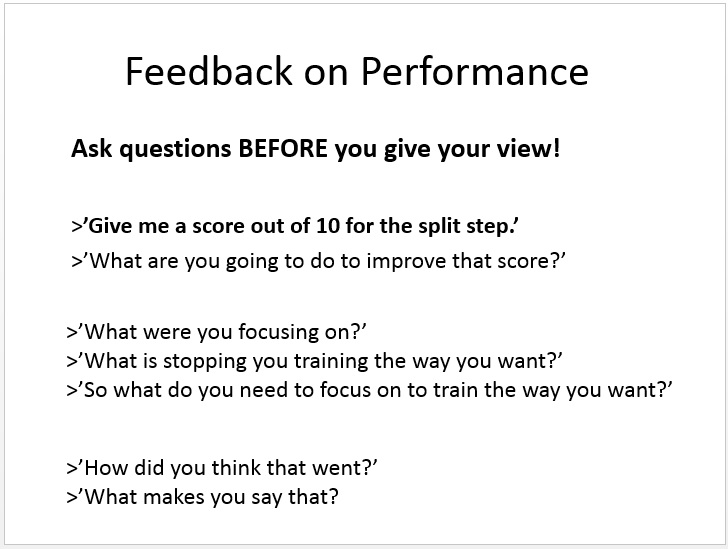Lessons we can learn from Sir Alex Ferguson
Two days ago I had the privilege to present to over 20 Performance Tennis coaches from Hertfordshire as part of the relaunch of the Herts Coaches Association.
Who cares how strong you get them!
I am in a fairly unique place having worked and specialised in performance Tennis for 12 years. Having been on the shoulder of some fantastic tennis coaches over the years I have a unique perspective which means I can relate all of the S&C work I do to the game. I think that is a massive part of an effective coaches’ tool kit- the ability to turn/TRANSFER kinetic gains in the gym (increased force/power etc) into kinematic gains on the sports field (improved set up and torque during skill execution).
The figure above highlights how movement efficiency in the gym in the form of a squat (fundamental movement skill) sets up longer term success in fundamental sports skills such as the set up stance when preparing to hit a ground stroke.
You can read more about this presentation in my previous blog Movement skills before Sport Skills, where I discussed LTAD, the Technical checklist and the processes involved in influencing movement efficiency.
In this blog I want to go into a bit more detail on the Mental processes that influence movement efficiency, or more generally the overall performance of an athlete or team.
From a Mental Performance factor stand point the ultimate goal is to get your athlete or team into a state of mind where they can FOCUS on the task at hand and give their 100% best effort. My inspiration for this blog came from watching a documentary/interview with Sir Alex Ferguson, who is regarded as perhaps one of the very best in the world at getting the best out of his players over his entire managerial career.
Knowing your players
When interviewed Sir Alex was asked whether he thought he coached through Fear or Love? He said that he thought it was a bit of both; you needed to know when to give someone a bit of love and an arm around the shoulder and when to give someone a bit of dressing down to get the best out of them.

Sir Alex was well known for his ‘hair drier’ treatment of certain players including Roy Keane, Ryan Giggs and even David Beckham. He wanted to let everyone know that no one was too big to get put in their place. Everyone except Eric Cantona, who Sir Alex knew was someone that no matter how reckless or poor his performances or behaviour was he would never respond to the stick. He always needed Love.
Christian Ronaldo spoke very highly of Sir Alex and spoke of how considerate of his situation he was when his Father was unwell; he said to Christian, take how ever long you want- one day, two days, a week- your family is the most important thing. We love you here at the club, you’re very important to us but family comes first.
We need to recognise that the athlete or team needs to be in the right state of mind to receive the coaching you want to give them. The Figure below shows the number of factors that can influence someone’s focus. Clearly Sir Alex had a great knowledge of his player’s and knew what things were going on in their life that could potentially have an influence on their performance. He clearly knew when to be positive but also when to really challenge someone with some tough words to get a response.
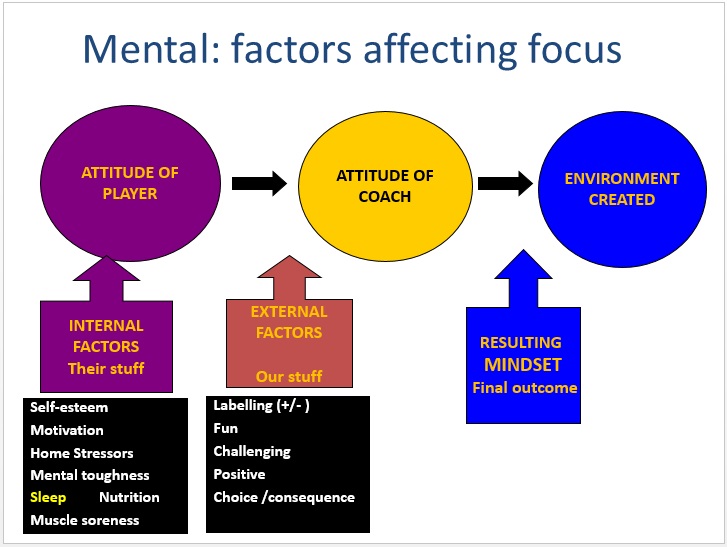
Internal factors
This is the mental ‘stuff’ that an athlete or team will bring to the session that can influence their focus.
External factors
This is the mental ‘stuff’ that we as coaches also need to bring to the session that can influence both our own and our athlete or team’s focus.
Resulting Mindset
The combination of the internal and external factors give us the resultant mindset which is part of the Environment you create as a coach.
Peak Performance Coaching
Your job as a coach is to get your athletes to focus and give 100% effort and in my opinion there are 3 aspects to coaching for achieving this that all top coaches have in abundance linked to their COMMUNICATION:
- Create the environment
- Set the Scene
- Ask for Feedback
Create the environment- it starts with respect!
Sir Alex said that it isn’t about coaching through either Fear or Love, it’s about having RESPECT. He also said it wasn’t about power it was about control. He wanted to make sure that he was in control of everyone and everything. But that’s for another blog about Leadership. Let’s talk a bit more about how someone like Sir Alex might influence his players during actual coaching sessions.
Overall there is a need for the individual or team to respect you. If they don’t respect you they won’t listen to you and they certainly won’t want to work for you. We all know you have to earn respect you can’t demand it. Having said that some people who have been there and done it will get instant respect such as former pros who turn managers or managers joining new clubs fresh from success with a previous club.
I personally think you earn respect in many ways.
Respect through your track record
I think people respect you when they can see that your methods get results- that helps.
Respect through being consistent
From my approach I try and earn respect because my athletes see I stand up for what I believe in and set clear rules for behaviour that I work hard to uphold. Maybe they don’t always like the strict approach but they learn to respect it because it creates an environment conducive to learning and not horse play. I personally start off with a fairly strict no nonsense approach but there is certainly plenty of room for fun too! However, if athletes break the rules then there are consequences for that.
Respect through trust
When you show someone that you are prepared to go above and beyond to support someone to achieve their goals it builds trust in you that you are there for them. Having an unconditional love for your athletes is really important. It is important to be able to always see the greatness in everyone. If you can’t do that then you aren’t the right person to be working with them. Having a positive label of the athlete is important- don’t label them as lazy, or having a poor attitude, you always need to focus on what they do well and where they are making progress. It’s about being positive.
”No one cares how much you know until they know how much you care”
Before the session starts
In my opinion one of the most important roles of a coach is to pay attention to your own as well as your athlete or team’s mindset going in to the session and bring them up or down to the right level to get them in their ‘optimal mindset.’
Assuming the athletes respect you they may still need a bit of help to get in the right mindset; that’s why coaches need to be in state of mind where they are neither under or over aroused.
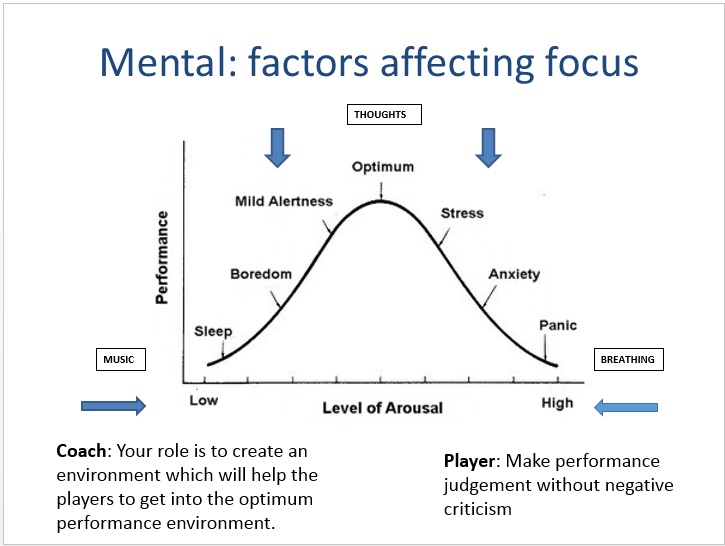
Having a presence – grab their attention!
There is no doubt that certain coaches seem to have more of a presence than others. One of the delegates at my presentation apparently remarked to another coach, ‘I thought he was shy?’ after seeing me present!
You see, in my every day life I’m quiet and I am not usually the one who is at the centre of attention or looking to get in the thick of the action. I prefer to be in the background and my leadership style is very mild mannered and consultative.
Yet in my coaching role, I see it like more than an audition; it’s a performance and people are coming to be entertained. In my presentation I had to keep more than 20 coaches entertained for nearly 3 hours! No easy task!
If you have a great presence you can use that to influence the energy of the athlete or group positively. If they are lacking in energy you can rally the troops with your enthusiasm. If they are over aroused, angry anxious and so on, you can calm them down with a controlled but authoritative voice. Both types of communication require a strong presence.
Be Passionate for the subject you are talking about
The easiest way to grab attention is to have lots of passion and enthusiasm for what you are talking about.
Use shake up activities
People are much more likely to be engaged when they are involved. Before you get stuck into your coaching session if you can see the energy in the group looks low a really easy tactic is to use a high energy game such as tag or any kind of game which has a ball- anything that requires them to compete and concentrate!!
Let them calm down first
Equally if you are about to give them some coaching and they come to you too hyped up or angry, let them calm down first- where you can either call a time out for the entire squad or an individual so they can calm down first.
Setting the Scene
This is a huge part of every coaching session. Now that the athletes are ready to listen with the right mindset you can now set the scene for the rest of the session.
The figure above summarises some of the things I spoke to the Herts Coaches about. Too often we get straight into the drill we want to work on without setting the scene properly. Tell them what they are going to do and then why- which can be done through you selling the importance of it (if it’s a new drill) or asking them why it is important and reinforcing that (motivating them).
Crucially you will want to remind them of what you are expecting from them. You may want use demonstrations to show what you are looking for from a performance point of view. You most definitely want to remind them that you are looking for 100% effort and focus.
Let the drill teach the skill
One of the the things I have learnt is that the easiest way to get people to work hard is to set the level of challenge high enough that the only way someone can achieve the goal is if they are focused.
Athletes will always respond well to drills that are:
- Fun
- Competitive
- Challenging
Generally speaking games based drills are more fun so rather than just doing closed technical drills, more open drills that involve running and use of a variety of skills are more fun. Athletes always enjoy opportunities to apply their skills.
Keep score to hold interest and promote competition and most importantly stretch your athletes by making them aware of world class levels of performance. I think it’s always easier to challenge them by setting the level high and see if they can reach it. To do this you as a performance coach need to have an awareness of standards and know what world class looks like!
Too often we might berate athletes for not working hard enough but if we don’t stretch them in the first place they may not have a reason to need to work hard!
Give them a choice
When you set the scene you can also:
a) give them a choice how hard they want to be challenged- they can decide how challenging they want the drills to be
b) give them a choice if they want to stop or keep going (when the drill is challenging)- but they must know that IF they decide to KEEP GOING they will need to meet the demands of the drill.
Ask for Feedback
You can learn a lot about what is going on in the head of an athlete by asking questions after completion of a drill. They can tell you what they were focusing on and they can even come up with ideas on what they think they need to do to improve their performance.
In my experience, if you give the athlete ownership of their performance they will often harder on the things they have come up with even if you think there is something else that may be more important! Sometimes it’s more effective to let them run with their own idea and see what happens!
By doing this you are also showing the athlete you are making them accountable to an agreed level when we set the scene earlier. It is very important to get agreement on the level of performance actually achieved. If it is not of a high enough level they have a choice- either improve to the level required or be asked to stop the session.
There is no place for mediocrity!
I hope you have enjoyed this blog.
If you would be interested in learning more about some of the skills and drills that form part of APA’s movement skills foundation to build high levels of coordination and strength in athletes who aspire to become a professional sportsman or woman then please book on to APA’s next workshop:
Title: Coordination and Strength Training for Sports
Date: October 31st 9am-12pm
Venue: Gosling Sports Park
Cost: £30
Full Details HERE
